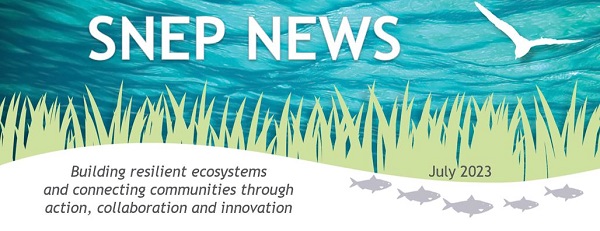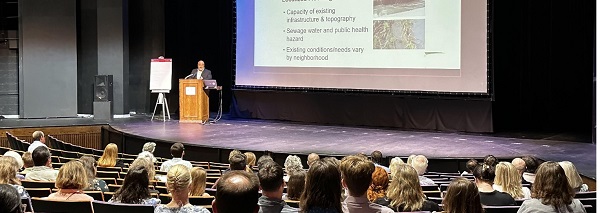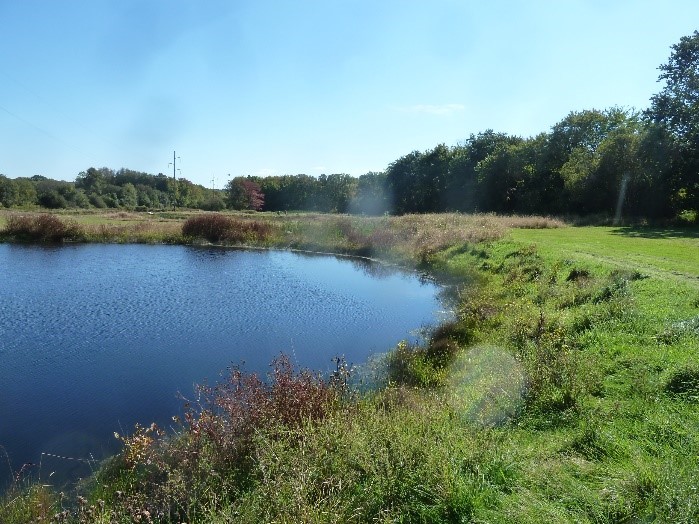SNEP

Fall River, MA: Dr. Christopher Obrupta of Rutgers’s University presenting his keynote address titled “Engaging Diverse Communities in Green Infrastructure Planning, Design, and Construction” at the 2023 SNEP Forum held at the Bristol Community College in Fall River, MA on June 13, 2023. Photo credit: Southeast New England Program.
Have a photo you want to submit? Submit your photos with a short caption and photo credit with permission of the photo owner to Reilly.Adam@epa.gov with the subject “SNEP Photo Submission.” Photos will be posted to the SNEP Photo Gallery on our website. Our favorite photo of the month will be featured in our next newsletter, so keep those submissions coming! Click to view the complete SNEP Media Gallery
Program Updates

On June 13, over 130 members of the SNEP community gathered at Bristol Community College in Fall River, MA to discuss ways that SNEP can better address regional environmental challenges. This all-day event featured thirteen community poster presentations and eleven hour-long, focused discussions on a wide range of topics. A summary document is being prepared that summarizes the key moments and next steps from the Forum and will be made available once complete. All presentations and posters will additionally be made available via the SNEP Forum website.
SNEP HABs Sampling
On Jun 20, SNEP team members conducted the first round of harmful algal bloom (HAB) sampling for 2023. This was the first of six sampling events planned over this summer which target lakes/ponds in disadvantaged areas of RI and Southeast MA. Samples were collected for nutrients, algal taxonomy, fluorimetry, and toxin analysis (should a bloom be detected). This data supports regional harmful algal bloom detection and research. For more information, please visit https://cyanos.org/bloomwatch/
SNEP Priority Research Grant Informational Webinar
On Jun 22, SNEP hosted an informational webinar for its most recent request for applications: the SNEP 2023 Priority Research Grant. SNEP anticipates making 3-6 awards worth a total of $800,000 (see next update). The recording is now available on the SNEP website.
There’s Still Time to Apply! EPA-SNEP Announces $800k for Regional Research: the “2023 SNEP Priority Research Grants” (EPA-R1-SNEP-2023R). SNEP anticipates awarding up to six (6) awards of $100,000-$300,000 each. Priority research areas can be found in Section I.B of the Request for Applications and include: modeling and assessing coastal lake and pond health; lessons learned from implementing permeable reactive barriers; and eelgrass viability: flowering and seeding, impacts of climate change, and long-term prognosis. Please navigate to the Grant Opportunity Link to find full opportunity details.
Important Dates:
06/22/23 (12:30-2:00PM EST): Informational Webinar/Q&A (Now posted to the SNEP website!)
07/24/23: Deadline to submit questions to SECoastalNE@EPA.GOV
07/28/23: Deadline to submit applications
SWIG

The SWIG program was well represented at the SNEP Forum, held on June 13 at Bristol County Community College in Fall River, MA. Tom Ardito, program director, provided an overview of the grants program in the morning plenary session, and facilitated two breakout discussion sessions later in the day. The first, “Keeping Track of Funding Opportunities,” gave participants a better understanding of grants and other funding for environmental restoration in Southeast New England – including not just SNEP, but other federal, state, and private sources as well. The second session focused on “Community-led Project Design, Learning and Engagement,” highlighting the work of six SWIG grantees, all of whom successfully developed collaborative restoration projects by working closely with communities. Both sessions were well attended with lively discussion.
A highlight of the Forum was the poster session, which was open throughout the day in a central space of the conference hall. About 20 SWIG grantees displayed posters of their SNEP-funded projects and staffed them during coffee breaks, giving conference participants the opportunity to learn more about the projects and, equally important, allowing grantees to meet and speak with one another. Sara Smith, Restore America’s Estuaries’ Grant Administrator, attended the meeting and welcomed the opportunity to meet many SWIG grantees. As this was the first major in-person SNEP meeting since the Covid pandemic, many participants expressed gratitude at being able to get together “in real life” and to finally meet people they had only spoken with on a computer screen. RAE staff, and our SNEP partners, are already looking forward to the next SNEP Forum!
Program Highlight: Bristol Municipal Golf Course and Silver Creek Wetland Restoration
Restored buffer area and pond at the Bristol golf course. Photo courtesy of Town of Bristol, RI.
Bristol’s municipal golf course is a nine-hole course, surrounded by dense industrial and residential uses. The course is located on 26 acres of land that were once a wetland forest, the headwaters of two important estuaries on the east side of Narragansett Bay – Bristol Harbor and the Warren River. With support from SWIG, the Town of Bristol restored freshwater wetlands at the golf course to reduce runoff of nutrients and bacteria from the course to the two downstream waterbodies, which are valued for swimming, fishing, shellfishing, boating, and many other recreational and commercial uses. In addition to its water quality benefits, the work reduced flooding, restored wetland ecology, and substantially improved the playability of the golf course, enhancing public access and enjoyment of the property.
The restoration work removed or reconfigured the man-made ponds, restored natural streams and streambanks, and replanted native shrubs, trees, and grasses. Previously, the golf course provided an ideal habitat for Canada geese. The geese fed in large numbers throughout the fall and winter on the golf course, and with no buffer between the turf and wetland areas, goose waste washed directly into ponds and streams. By converting areas adjacent to streams and ponds from managed turf to native wetland vegetation, the restoration reduced the feeding area for geese, reduced the amount of nutrient-rich runoff from the managed turf, and created a natural filter between the streams and surrounding developments.
The project included a robust public outreach and engagement component with many stakeholders, including Bristol Dept. of Parks and Recreation, Golf Course Committee, Save the Bay, Save Bristol Harbor, Mt. Hope High School, and the Bristol Conservation Commission. Volunteers from these organizations provided input into the project design and assisted in the field, planting over 2,000 native shrubs and trees. In addition to SWIG, funding for the work was provided by the R.I. Dept. of Environmental Management and the R.I. Infrastructure Bank. With construction now complete and a new operator under contract with the Town, the golf course will reopen for play this summer.
